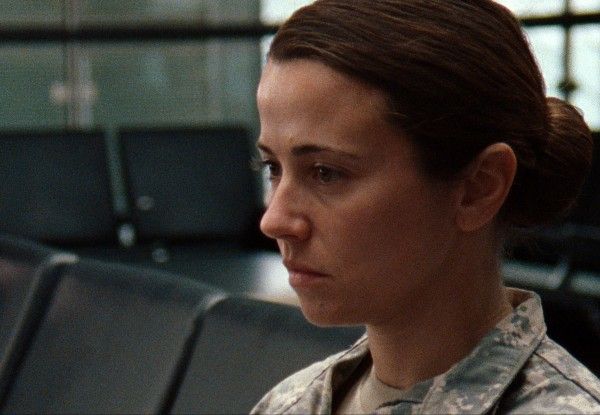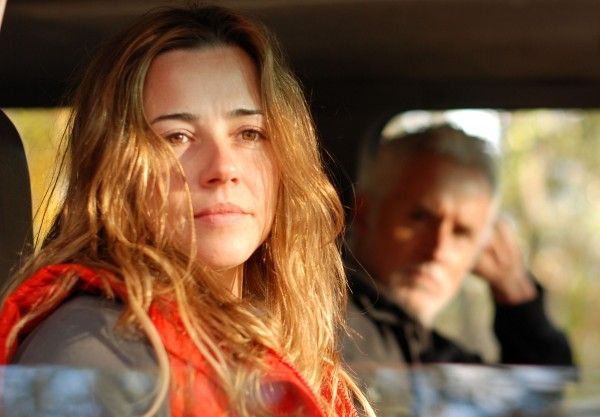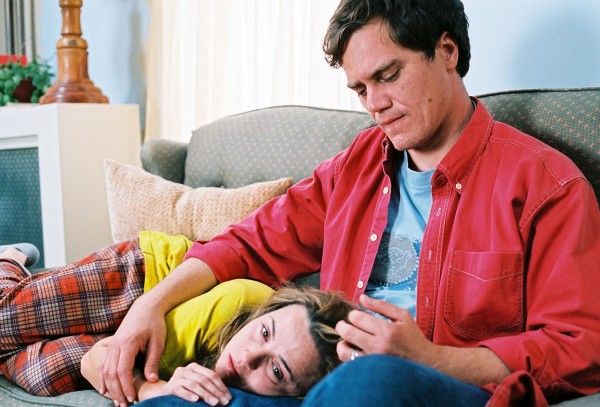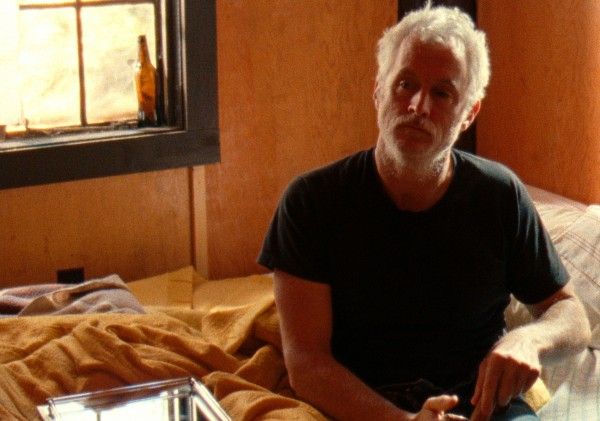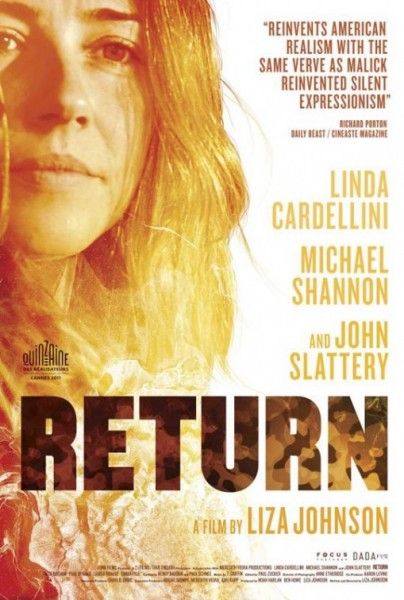The indie drama Return (opening in theaters on February 10th) tells the story of Kelli (Linda Cardellini), a woman back from a military tour of duty, who’s looking forward to rejoining her old life with her husband (Michael Shannon) and children. Even though she wanted nothing more than to experience the feelings of everyday life again, she slowly realizes that her world has become unfamiliar. Her friends and family just don’t understand what she’s been through, and she doesn’t know how to overcome that to move forward.
During this recent exclusive phone interview with Collider, actress Linda Cardellini talked about what attracted her to this role, finding ways to identify with this woman even though she never chose to make the same sacrifice, talking to people with similar experiences to hear their stories and how they dealt with returning home after war, working with two amazing co-stars like Michael Shannon (Boardwalk Empire) and John Slattery (Mad Men), and the challenges of being on screen for almost every single minute of the film. She also talked about last year’s Freaks and Geeks reunion at PaleyFest and what it was like to see not just her co-stars but their families again, how she got interested in writing and developing her own projects, and what she’s looking for now in acting roles. Check out what she had to say after the jump:
Collider: How did this film come about for you?
LINDA CARDELLINI: After E.R., I took a step back and wanted to wait to do something that I could really sink my teeth into. I thought about doing a play, and I went to New York and was feeling things out there. My agent said, “I have this script for you, if you’d like to meet with her tomorrow while you’re in town,” ‘cause I was about to go back to Los Angeles. So, I read the script that night and called my agent and said, “I’d really love to meet with her. This is an amazing part for an actress.”
I went in and met (writer/director) Liza [Johnson] the next day, and the way that she spoke about things, it was so beautiful, the details that she thought were so important and the silences that she thought were so important. I thought this was really a different way of looking at this type of film and character. Even though it was written by a woman about a woman returning home from war, it seemed to be less gender specific. It wasn’t about some terrible, traumatic event that happened. They do happen, but it seemed like just a slow unraveling of somebody, which I found to be really human, really interesting and really relevant, at that time, which was a couple years ago. Now, it’s even more relevant, with people returning from overseas, as they have been and as they will continue to be.
I really loved the way that Liza spoke about the film. The everyday human details were really special and really excited me about playing it. And, we really hit it off. For about a year, as we waited for the film to go and Liza tried to get the money together with the producers, it turned into a luxury for us. It was frustrating, at times, because you want so badly for a movie to be made, but we had the luxury of really taking time to research and educate ourselves about what we were about to embark on.
Did you find it difficult to identify with this woman?
CARDELLINI: I think the thing that I was able to connect with was the feeling of alienation, and of people having expectations of you that you can’t quite live up to within yourself, and the guilt of those feelings. Those things are very human. For me, doing the amount of research that we did, was important because it’s a great sacrifice that I, as a person, never chose to make, but the people in the armed forces make it, in order to dedicate their lives to going overseas and representing our country and putting their lives on the line while the rest of us go about our daily life. I felt a debt of gratitude and I wanted to be able to respect them and understand them, as much as possible, in terms of representing them.
In putting on the uniform, there was a sense of pride, and then also a sense of, “Oh, my god, people are really suiting up and going out there, every single day, and they’re doing something that I would be much too afraid to do.” While I relate to her on a human level, I wanted to learn as much as I could about what it was like to be a part of the military, since that was a choice I didn’t make, in my life. I have family members who are in the service, and I think all of us know somebody who is in the service, but there’s a small percentage of our country that does a huge job for the rest of this country.
Did you talk to a lot of people who had had similar experiences?
CARDELLINI: You know, everybody has a different experience, male and female. But, there are some common threads that echoed in different people’s stories. There was this thing that I kept hearing, that was revealed in the movie, that it’s very hard for people to talk about it with other people and explain what the trauma or tragedy or feelings are. One of the things I found was the inability to communicate with people that you used to be closest to. That’s really difficult to understand, for both the people who are home and the people who are away. The way that Michael Shannon’s character handles things, although he does things that people don’t approve of, you understand that here’s somebody who’s been waiting for his life to come back together and it doesn’t come back together the way that he wants, and what that does to a family, and what a sacrifice that is for the person who stays home, as well.
Was it important to you to keep your performance understated, so that audiences get the full emotional impact of the story?
CARDELLINI: We played it many different ways. Liza [Johnson] orchestrated the performances with such restraint and the film was so beautiful, the way they shot it, that I was really pleased. I thought it had such a different voice than most of the films that I’ve seen about anybody returning from war. I was really pleased by it. When showing the film to people, female and male could relate to it. We’ve had some responses from people who are actually in the armed forces and they seem to be responding really well, in terms of thinking that it’s realistic, which is a huge compliment to us. She did a really great job with it. It’s her first feature film and I think she’s really talented. They’re very human feelings set in an extraordinary situation.
Did you find that it was common for people who come back to turn to things like alcohol, so they don’t have to deal with the pain that they don’t know how to communicate?
CARDELLINI: I found that some people did and some people didn’t. There really wasn’t one specific story. I spoke with one person who had never really touched any dugs or alcohol, and that was something that they felt was comforting when they came home. And then, there were other people who were able to deal with it and were redeployed again and were fine. They didn’t have the same symptoms. It really runs the gamut of human emotion and the way that people handle things. One woman I spoke to was happy to go back and help out her brothers and sisters over there again. It wasn’t nearly the same story as Kelli, at all.
How was it to work with both Michael Shannon and John Slattery?
CARDELLINI: They were both fantastic, I have to say. They were both generous and talented actors. Michael was so fantastic. I spent so much time on screen alone. When he got there, the relationship between the two of us happened very fast because we were shooting so rapidly. It was so nice to have somebody who is so talented to be able to play with on set. And, he was really, really good with the kids. They loved him. That was really great too because I didn’t have as much time to spend with them. I was slightly alienated from the children, at first, which was perfect because it lent itself to me being more awkward with the children and that would have been the case, after having been away for a year. He’s just incredible. He’s such a fantastic actor, and a really funny, really warm person. I don’t know if people know that because he always plays somebody so crazy. He’s the straight guy in this, and I think that he’s fantastic. We had a lot of fun. The things that she goes through with him, especially, tell a lot of the story of her inner life.
And then, John Slattery was really fun, too. At that point, I had been working for so long, in this one way, where everything is toppling on top of Kelli, and then here comes John’s character and they have this moment of relief together, which was really fun. We were freezing, in this little tiny cabin, up at this beautiful lake in upstate New York. It was so cold, but we had the greatest time. We just really had fun, and it was really good for me to be able to have that much fun on screen with somebody, pretending to be drunk and getting into bed with him. It was a really nice break for my character. Everybody was really game to do anything and everything for the film, from the cast to the crew. Nobody worked for a lot of money. Everybody worked for the love of it. People really believed in Liza [Johnson] and the project, and it was a joy to be a part of. It was not an easy shoot, compared to some other things that I’ve done, but it was really rewarding.
Were you prepared for what it would take to be on screen for almost every minute of the film?
CARDELLINI: No! I was prepared. I was the most prepared I’ve ever been for anything in my life, but you don’t really realize what it’s going to take until you’re in there doing it. But, it was amazing. I wouldn’t trade a single moment of it.
The PaleyFest event for Freaks and Geeks was amazing and it really felt like a real reunion for everyone. What was that experience like for you? Was that the first time you had gotten to see some of the cast since you’d wrapped?
CARDELLINI: Some of them, yes. I hadn’t seen Lea Sheppard since we shot, and that was such a great treat. It was so nice because so many people were so young that it was nice to see people’s parents. Seeing people’s parents and realizing how close you were to people’s families when you were shooting, it was so nice. We really had such an amazing time on that show – all of us, together – that it was pretty fun to be back in the same place with everybody. It was almost every single person, so it felt really good. But, it did feel like a high school reunion. I never went to a high school reunion, so I don’t know, but that’s about as close as I’ve ever gotten. The crazy thing was, when we drove up to get into the venue, there was this line around the corner. I was like, “What are all these people waiting for?,” and then I realized, “Oh, my god, they’re waiting for Freaks and Geeks!” To have that experience, over 10 years later, when we got canceled and didn’t even get to finish a whole season, is pretty amazing!
What attracted you to writing? Is that something you always wanted to do, or did that happen along the way of your acting career?
CARDELLINI: It is something I’ve always liked to do. I always did it in school, and always wanted to do it. And then, a friend of a friend moved out here and said, “I moved out here to be a writer and I’ve love to write something for you,” and I said, “Oh, my god, that’s fantastic! Great! Let’s sit down and talk about it.” And, we started talking about something entirely different from that. We started talking about this idea and he said, “Do you want to write it with me?” I said, “Absolutely! I’ll give it a try.” So, we wrote a TV pilot, just out of nowhere really, and we ended up selling it. I gave it to my boss, at the time, who was (executive producer) John Wells, and I said, “Could you look at this and just tell me if I’m off base? I know every actor wants to be a writer or director, but could you just look at this and tell me what you think?” And then, they bought the project. Nothing ever happened with that project, but then I thought, “Okay, maybe we can do this.” So, this is our second try, and we’ll see what happens. I actually really like it. It’s a really interesting and wonderful exercise for me, as an actor and as a person.
CARDELLINI: We’re developing a cable show. We’ll see what happens. It’s a long journey. I have great respect for writers. It’s a long and arduous process.
With such a diverse range of roles, in TV and film, is there something that you look for in projects now?
CARDELLINI: You know, that’s a good question. I usually just go with whatever moves me, at the time. Sometimes it’s where I am in life. I remember when I took the role on E.R., I thought, “I haven’t really been able to play a working class woman. I’ve played girls, I’ve played funny, but I haven’t played a working class woman. That sounds like something I’d like to do.” And then, when this came along, I thought, “Wow, this is really speaking to what’s happening right now, in a part of America, and that’s something that I’d like to learn about.” Oftentimes, it’s something that I just feel interested in learning about. I’d love to do some comedy again soon. I haven’t done any in awhile, so that would be fun. One thing I like about trying to write is that I can possibly write myself a role. Otherwise, you’re at the mercy of whatever roles are out there that people are willing to give to you.

